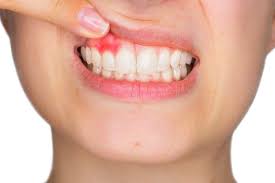Canker sores are a common and painful condition that affects many people. These small ulcers can form on the inside of the mouth, including the tongue, gums, and cheeks, and can cause discomfort when eating, drinking, and speaking. While canker sores typically go away on their own within a week or two, there are several steps you can take to alleviate the symptoms and speed up the healing process. In this blog, we will discuss how to get rid of canker sores.
Follow These For Refief From Canker Sores:
The following ideas have been suggested by an experienced dental team so you can try them with confidence. These will surely help you.
Over-the-counter treatments:
One of the most effective ways to get rid of canker sores is by using over-the-counter treatments. These can include gels, pastes, and mouthwashes that contain numbing agents, such as benzocaine or lidocaine, which can help to reduce pain and discomfort. Additionally, topical treatments containing corticosteroids, such as hydrocortisone, can reduce inflammation and promote healing.
Saltwater rinse:
A saltwater rinse is a simple yet effective remedy for canker sores. Mix a teaspoon of salt with warm water and swish the solution around your mouth for about a minute before spitting it out. This can help to reduce inflammation and promote healing of the ulcer.
Baking soda rinse:
Another simple and effective remedy is a baking soda rinse. Mix a teaspoon of baking soda with a small amount of water to form a paste, then apply it directly to the canker sore. Leave the paste on for a few minutes before rinsing with water. This can help to neutralise the acid in your mouth and promote healing.
Tea tree oil:
Tea tree oil is a natural remedy that has been shown to help alleviate canker sore symptoms. Dilute a few drops of tea tree oil with carrier oil, such as coconut or olive oil, then apply it to the canker sore with a cotton swab. This can help to reduce inflammation and promote healing.
Avoid certain foods:
Certain foods, such as acidic or spicy foods, can irritate canker sores and make them worse. Avoid these foods until the ulcer has healed.
Practise good oral hygiene:
Good oral hygiene can help to prevent canker sores from forming and promote healing. Brush and floss regularly, and avoid using harsh or abrasive toothpaste or mouthwash. Additionally, avoid biting or picking at the canker sore, as this can cause further irritation and delay healing.
Stress management:
Stress can be a trigger for canker sores, so practising stress management techniques can help to prevent them from forming. Exercise, meditation, and deep breathing can all help to reduce stress and promote overall health and wellness.
If your canker sore is particularly painful or does not go away within a few weeks, you should consult with your dentist or doctor. They may prescribe a stronger medication, such as a topical or oral corticosteroid, to help alleviate symptoms and promote healing.
Other Common Dental Issues: You Can’t Ignore
- Tooth decay: Tooth decay occurs when the enamel on your teeth is weakened by bacteria and acids. This can cause cavities or holes in your teeth. Symptoms may include toothache, sensitivity to hot and cold, or visible pits or holes in the teeth. Preventing tooth decay includes practising good oral hygiene habits such as brushing and flossing regularly, avoiding sugary foods and drinks, and visiting your dentist regularly for check-ups.
- Gum disease: Gum disease, also known as periodontal disease, is caused by the buildup of plaque on your teeth and gums. It can lead to inflammation and infection of the gums, which can cause bleeding, swelling, and even tooth loss. Regular brushing and flossing, as well as professional cleanings by your Gum Specialist, can help prevent gum disease.
- Tooth sensitivity: Tooth sensitivity is a common dental problem that can cause discomfort or pain when eating or drinking hot or cold foods and beverages. It can be caused by several factors, such as tooth decay, receding gums, or grinding of the teeth. Your dentist may recommend special toothpaste or fluoride treatments to help alleviate tooth sensitivity.
- Bad breath: Bad breath, also known as halitosis, can be caused by poor oral hygiene, gum disease, or other health conditions. In addition to practising good oral hygiene habits, such as brushing and flossing regularly, drinking plenty of water and avoiding tobacco and alcohol can help prevent bad breath.
- Oral cancer: Oral cancer is a serious condition that can affect the lips, tongue, cheeks, and other areas of the mouth. It can be caused by several factors, such as tobacco and alcohol use, as well as HPV infection. Symptoms of oral cancer may include red or white patches in the mouth, swelling, or sores that do not heal. Regular dental check-ups can help detect and prevent oral cancer.
Conclusion
Canker sores and other dental issues can be painful and uncomfortable condition, but there are several steps you can take to alleviate the symptoms and promote healing. By using over-the-counter treatments, practising good oral hygiene, and managing your teeth with the help of a dentist, you can get rid of all dental problems and enjoy a healthy, pain-free mouth.

